安徒生童话故事第在养鸭场里The Portuguese Duck
【安徒生童话】安徒生童话 在养鸭场里
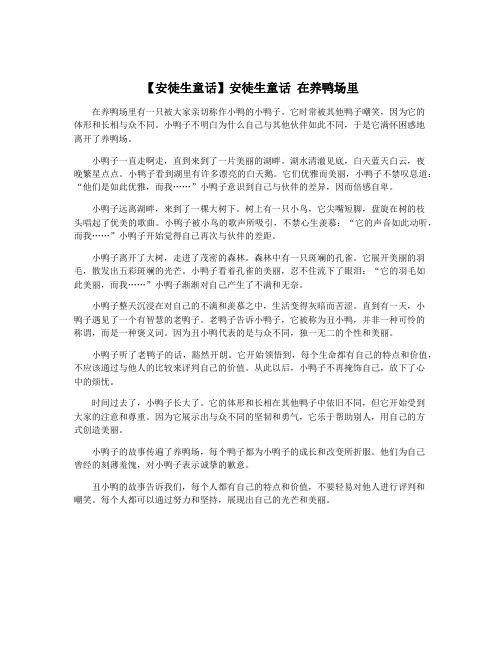
【安徒生童话】安徒生童话在养鸭场里在养鸭场里有一只被大家亲切称作小鸭的小鸭子。
它时常被其他鸭子嘲笑,因为它的体形和长相与众不同。
小鸭子不明白为什么自己与其他伙伴如此不同,于是它满怀困惑地离开了养鸭场。
小鸭子一直走啊走,直到来到了一片美丽的湖畔。
湖水清澈见底,白天蓝天白云,夜晚繁星点点。
小鸭子看到湖里有许多漂亮的白天鹅。
它们优雅而美丽,小鸭子不禁叹息道:“他们是如此优雅,而我……”小鸭子意识到自己与伙伴的差异,因而倍感自卑。
小鸭子远离湖畔,来到了一棵大树下。
树上有一只小鸟,它尖嘴短脚,盘旋在树的枝头唱起了优美的歌曲。
小鸭子被小鸟的歌声所吸引,不禁心生羡慕:“它的声音如此动听,而我……”小鸭子开始觉得自己再次与伙伴的差距。
小鸭子离开了大树,走进了茂密的森林。
森林中有一只斑斓的孔雀。
它展开美丽的羽毛,散发出五彩斑斓的光芒。
小鸭子看着孔雀的美丽,忍不住流下了眼泪:“它的羽毛如此美丽,而我……”小鸭子渐渐对自己产生了不满和无奈。
小鸭子整天沉浸在对自己的不满和羡慕之中,生活变得灰暗而苦涩。
直到有一天,小鸭子遇见了一个有智慧的老鸭子。
老鸭子告诉小鸭子,它被称为丑小鸭,并非一种可怜的称谓,而是一种褒义词。
因为丑小鸭代表的是与众不同,独一无二的个性和美丽。
小鸭子听了老鸭子的话,豁然开朗。
它开始领悟到,每个生命都有自己的特点和价值,不应该通过与他人的比较来评判自己的价值。
从此以后,小鸭子不再掩饰自己,放下了心中的烦忧。
时间过去了,小鸭子长大了。
它的体形和长相在其他鸭子中依旧不同,但它开始受到大家的注意和尊重。
因为它展示出与众不同的坚韧和勇气,它乐于帮助别人,用自己的方式创造美丽。
小鸭子的故事传遍了养鸭场,每个鸭子都为小鸭子的成长和改变所折服。
他们为自己曾经的刻薄羞愧,对小鸭子表示诚挚的歉意。
丑小鸭的故事告诉我们,每个人都有自己的特点和价值,不要轻易对他人进行评判和嘲笑。
每个人都可以通过努力和坚持,展现出自己的光芒和美丽。
安徒生丑小鸭原文-安徒生作品丑小鸭的故事
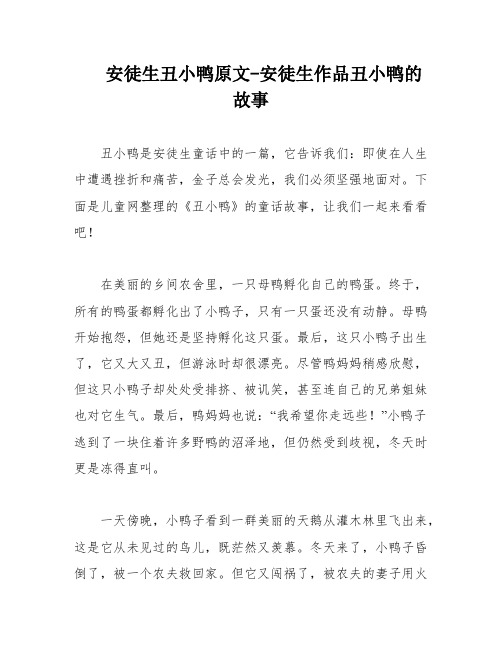
安徒生丑小鸭原文-安徒生作品丑小鸭的故事丑小鸭是安徒生童话中的一篇,它告诉我们:即使在人生中遭遇挫折和痛苦,金子总会发光,我们必须坚强地面对。
下面是儿童网整理的《丑小鸭》的童话故事,让我们一起来看看吧!在美丽的乡间农舍里,一只母鸭孵化自己的鸭蛋。
终于,所有的鸭蛋都孵化出了小鸭子,只有一只蛋还没有动静。
母鸭开始抱怨,但她还是坚持孵化这只蛋。
最后,这只小鸭子出生了,它又大又丑,但游泳时却很漂亮。
尽管鸭妈妈稍感欣慰,但这只小鸭子却处处受排挤、被讥笑,甚至连自己的兄弟姐妹也对它生气。
最后,鸭妈妈也说:“我希望你走远些!”小鸭子逃到了一块住着许多野鸭的沼泽地,但仍然受到歧视,冬天时更是冻得直叫。
一天傍晚,小鸭子看到一群美丽的天鹅从灌木林里飞出来,这是它从未见过的鸟儿,既茫然又羡慕。
冬天来了,小鸭子昏倒了,被一个农夫救回家。
但它又闯祸了,被农夫的妻子用火钳打,于是它飞走了。
最终,小鸭子飞到了一座大花园,在那里它又遇见了美丽的天鹅。
看到自己的倒影,它惊讶地发现自己已经变成了一只天鹅,而不再是那只粗笨、丑陋的鸭子了。
这个故事告诉我们,即使生活在鸡窝里,只要是一只天鹅蛋,也会成为美丽的天鹅。
我们要坚强地面对人生中的挫折和痛苦,因为金子总会发光。
孩子们围绕着丑小鸭,向它投掷着画包片和麦粒。
许多大天鹅在它周围游泳,并用嘴吻它,这让丑小鸭感到非常幸福和快乐。
它感慨道:“当我还是一个丑小鸭的时候,我做梦也没想到会有这么幸福!”丑小鸭的坚持自我是其难能可贵之处。
但这种坚持并不是一开始就有的。
从鸡鸭群中逃出来的小鸭一开始只是悲观和逃避,甚至可以说是谦卑。
它刚逃出来时,看到灌木林里的小鸟向空中飞去,认为是它自己“非常丑陋而惊吓了它们”。
但是,有生活常识的人都应该知道这是很正常的事情,小鸟的“惊恐”只是小鸭自己认为而已。
当公雁高傲地问小鸭时,小鸭尽可能恭恭敬敬地行礼。
当猎狗嫌弃它太小不足猎而跑开时,它认为是因为自己“丑得连猎狗也不咬我了”。
安徒生童话在养鸭场里(2)
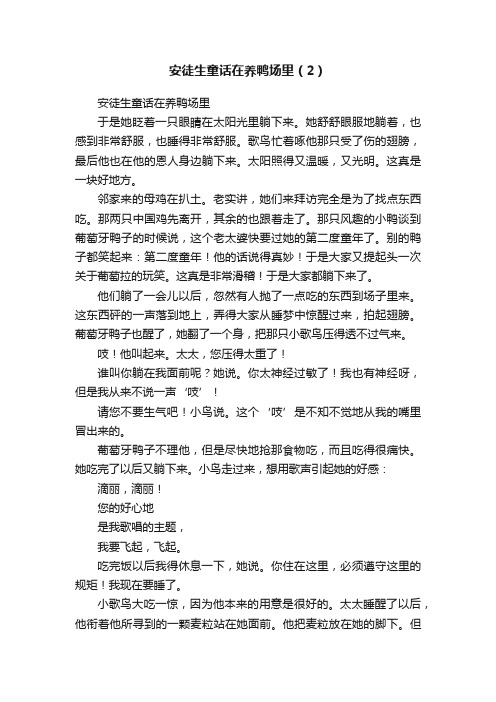
安徒生童话在养鸭场里(2)安徒生童话在养鸭场里于是她眨着一只眼睛在太阳光里躺下来。
她舒舒眼服地躺着,也感到非常舒服,也睡得非常舒服。
歌鸟忙着啄他那只受了伤的翅膀,最后他也在他的恩人身边躺下来。
太阳照得又温暖,又光明。
这真是一块好地方。
邻家来的母鸡在扒土。
老实讲,她们来拜访完全是为了找点东西吃。
那两只中国鸡先离开,其余的也跟着走了。
那只风趣的小鸭谈到葡萄牙鸭子的时候说,这个老太婆快要过她的第二度童年了。
别的鸭子都笑起来:第二度童年!他的话说得真妙!于是大家又提起头一次关于葡萄拉的玩笑。
这真是非常滑稽!于是大家都躺下来了。
他们躺了一会儿以后,忽然有人抛了一点吃的东西到场子里来。
这东西砰的一声落到地上,弄得大家从睡梦中惊醒过来,拍起翅膀。
葡萄牙鸭子也醒了,她翻了一个身,把那只小歌鸟压得透不过气来。
吱!他叫起来。
太太,您压得太重了!谁叫你躺在我面前呢?她说。
你太神经过敏了!我也有神经呀,但是我从来不说一声‘吱’!请您不要生气吧!小鸟说。
这个‘吱’是不知不觉地从我的嘴里冒出来的。
葡萄牙鸭子不理他,但是尽快地抢那食物吃,而且吃得很痛快。
她吃完了以后又躺下来。
小鸟走过来,想用歌声引起她的好感:滴丽,滴丽!您的好心地是我歌唱的主题,我要飞起,飞起。
吃完饭以后我得休息一下,她说。
你住在这里,必须遵守这里的规矩!我现在要睡了。
小歌鸟大吃一惊,因为他本来的用意是很好的。
太太睡醒了以后,他衔着他所寻到的一颗麦粒站在她面前。
他把麦粒放在她的脚下。
但是她没有睡好,因此她的心情自然不佳。
把这送给小鸡吃吧,她说,不要老呆在我旁边呀!但是您为什么要生我的气呢?他问。
我做了什么对不起您的事情呢?做了什么对不起我的事情!葡萄牙鸭子说。
你用的字眼不太文雅!这一点我请你注意。
昨天这里有太阳光,小鸟说。
今天这里却是阴暗的!这使我感到怪难过的。
你对于天气的知识是一窍不通!葡萄牙鸭子说。
这一天还没有完呀。
不要呆在这儿像一个傻瓜吧!您看人的这副凶样子,跟我落到这里时那些恶眼睛看我的凶样子差不多。
安徒生童话故事丑小鸭
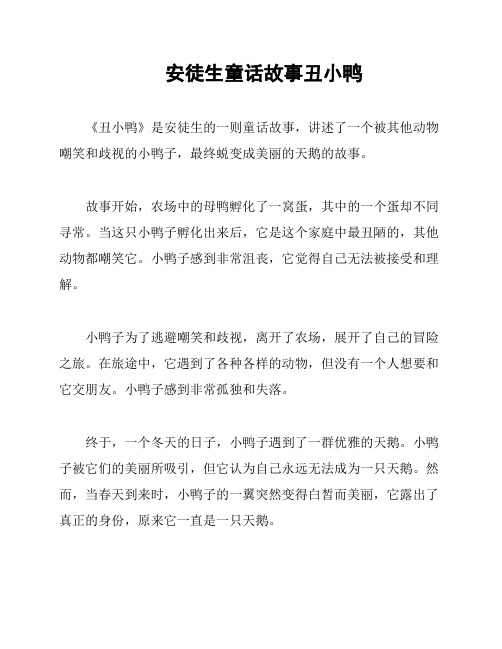
安徒生童话故事丑小鸭
《丑小鸭》是安徒生的一则童话故事,讲述了一个被其他动物嘲笑和歧视的小鸭子,最终蜕变成美丽的天鹅的故事。
故事开始,农场中的母鸭孵化了一窝蛋,其中的一个蛋却不同寻常。
当这只小鸭子孵化出来后,它是这个家庭中最丑陋的,其他动物都嘲笑它。
小鸭子感到非常沮丧,它觉得自己无法被接受和理解。
小鸭子为了逃避嘲笑和歧视,离开了农场,展开了自己的冒险之旅。
在旅途中,它遇到了各种各样的动物,但没有一个人想要和它交朋友。
小鸭子感到非常孤独和失落。
终于,一个冬天的日子,小鸭子遇到了一群优雅的天鹅。
小鸭子被它们的美丽所吸引,但它认为自己永远无法成为一只天鹅。
然而,当春天到来时,小鸭子的一翼突然变得白皙而美丽,它露出了真正的身份,原来它一直是一只天鹅。
这个故事告诉我们,外表并不决定一个人的价值。
即使被嘲笑和歧视,我们也可以通过自己的努力和坚持,找到真正属于自己的归属和价值。
正如小鸭子最终变成了美丽的天鹅一样,我们每个人都有潜力变得与众不同。
这个经典的童话故事向我们传达了积极的价值观和对自我接受的重视。
它提醒我们要有勇气面对困难和挑战,相信自己的内在美和潜力。
无论我们在生活中遇到什么困境,都应该保持积极乐观的态度,相信自己可以达到更好的未来。
《丑小鸭》是一则充满希望和鼓舞人心的童话故事,它给予我们力量和信心,让我们相信每个人都能找到真正属于自己的价值和幸福。
小学英语安徒生童话系列四ThePortugueseDuck在鸭场里阅读素材
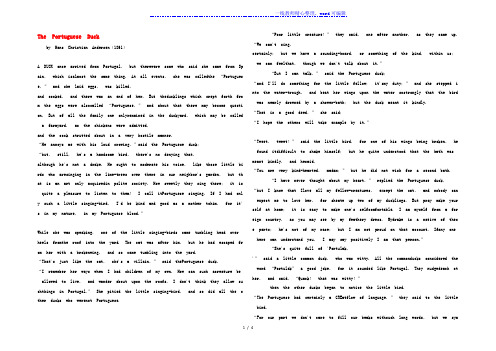
The Portuguese Duckby Hans Christian Andersen(1861)A DUCK once arrived from Portugal,but therewere some who said she came from Sp ain,which isalmost the same thing. At all events,she was calledthe “Portugues e,”and she laid eggs,was killed,and cooked,and there was an end of her. But theducklings which crept forth fro m the eggs were alsocalled “Portuguese,”and about that there may besome questi on. But of all the family one onlyremained in the duckyard,which may be calleda farmyard,as the chickens were admitted,and the cock strutted about in a very hostile manner.“He annoys me with his loud crowing,”said the Portuguese duck;“but,still,he's a handsome bird,there's no denying that,although he's not a drake. He ought to moderate his voice,like those little bi rds who aresinging in the lime-trees over there in our neighbor's garden,but th at is an art only acquiredin polite society. How sweetly they sing there;it is quite a pleasure to listen to them!I call itPortuguese singing. If I had onl y such a little singing-bird,I'd be kind and good as a mother tohim,for it' s in my nature,in my Portuguese blood.”While she was speaking,one of the little singing-birds came tumbling head over heels fromthe roof into the yard. The cat was after him,but he had escaped fr om her with a brokenwing,and so came tumbling into the yard.“That's just like the cat,she's a villain,”said thePortuguese duck.“I remember her ways when I had children of my own. How can such acreature be allowed to live,and wander about upon the roofs. I don't think they allow su chthings in Portugal.”She pitied the little singing-bird,and so did all the o ther ducks who werenot Portuguese.“Poor little creature!”they said,one after another,as they came up. “We can't sing,certainly;but we have a sounding-board,or something of the kind,within us;we can feelthat,though we don't talk about it.”“But I can talk,”said the Portuguese duck;“and I'll do something for the little fellow;it'smy duty;”and she stepped i nto the water-trough,and beat her wings upon the water sostrongly that the bird was nearly drowned by a shower-bath;but the duck meant it kindly.“That is a good deed,”she said;“I hope the others will take example by it.”“Tweet,tweet!”said the little bird,for one of his wings being broken,he found itdifficult to shake himself;but he quite understood that the bath was meant kindly,and hesaid,“You are very kind-hearted,madam;”but he did not wish for a second bath.“I have never thought about my heart,”replied the Portuguese duck,“but I know that Ilove all my fellow-creatures,except the cat,and nobody can expect me to love her,for sheate up two of my ducklings. But pray make your self at home;it is easy to make one's selfcomfortable. I am myself from a for eign country,as you may see by my feathery dress. Mydrake is a native of thes e parts;he's not of my race;but I am not proud on that account. Ifany onehere can understand you,I may say positively I am that person.”“She's quite full of 'Portulak,'”said a little common duck,who was witty. All the commonducks considered the word “Portulak” a good joke,for it sounded like Portugal. They nudgedeach ot her,and said,“Quack!that was witty!”then the other ducks began to notice the little bird.“The Portuguese had certainly a GREatflow of language,”they said to the little bird.“For our part we don't care to fill our beaks withsuch long words,but we sympathize with you quite as much. If we don't do anything else,we can walk about with you everywhere,and we think that is the best thing we can do.”“You have a lovely voice,”said one of the eldest ducks;“it must be GREat satisfaction toyou to be able to give so much pleasure as yo u do. I am certainly no judge of your singing so Ikeep my beak shut,which is better than talking nonsense,as others do.”“Don't plague him so,”interposed the Portuguese duck;“he requires rest and nursing.My little singing-bird do you wish me to prepare a nother bath for you?”“Oh,no!no!pray let me dry,”implored the little bird.“the water-cure is the only remedy for me,when I am not well,”said the Po rtuguese.“Amusement,too,is very beneficial. The fowls from the neighborhood will soon be here topay you a visit. There are two Cochin Chinese amongst them;they wear feathers on theirlegs,and are well educated. They have been brought from a GR Eat distance,andconsequently I treat them with greater respect than I do the ot hers.”then the fowls arrived,and the cock was polite enough to-day to keep from bein g rude. “You are a real songster,”he said,“you do as much with your little voice as it is possible todo;but there requ ires more noise and shrillness in any one who wishes it to be known who heis.”the two Chinese were quite enchanted with the appearance of the singing-bird. Hisf eathers had been much ruffled by his bath,so that he seemed to them quite lik e a tinyChinese fowl.“He's charming,”they said to each other,and began a conversation with himin whispers,using the most aristocratic Chinese dialect:“We are of the same race asyourself,”they said.“The ducks,even the Portuguese,are all aquatic birds,as you musthave notice d. You do not know us yet,—very few know us,or give themselves the trouble tomake our acquaintance,not even any of the fowls,though we are born to occupy a highergrade in society than most of them. But that does not disturb us,we quietly go on in ourown way among the rest,whose ideas are certainly not ours;for we look at the bright side ofthings,and only speak what is good,although that is sometimes v ery difficult to find wherenone exists. Except ourselves and the cock there is no t one in the yard who can be calledtalented or polite. It cannot even be said of the ducks,and we warn you,little bird,not totrust that one yonder,wit h the short tail feathers,for she is cunning;that curiouslymarked one,with the crooked stripes on her wings,is a mischief-maker,and never lets anyone ha ve the last word,though she is always in the wrong. That fat duck yonder spea ks evil ofevery one,and that is against our principles. If we have nothing goo d to tell,we close ourbeaks. The Portuguese is the only one who has had any education,and with whom we canassociate,but she is passionate,and talks too much about 'Portugal.'”“I wonder what those two Chinese are whispering about,”whispered one duck toan other;“they are always doing it,and it annoys me. We never speak to them.”Now the drake came up,and he thought the little singing-bird was a sparrow. “Well,Idon't understand the difference,”he said;“it appears to me all the same. He's only aplaything,and if people will have playthings,why let them,I say.”“Don't take any notice of what he says,”whispered the Portuguese;“he's very well inmatters of business,and with him business is placed before e verything. But now I shall liedown and have a little rest. It is a duty we owe to ourselves that we may be nice and fat whenwe come to be embalmed with sageand onions and apples.”So she laid herself down in thesun and winked with on e eye;she had a very comfortable place,and felt so comfortable thatshe fell asleep. The little singing-bird busied himself for some time with his broken wing ,andat last he lay down,too,quite close to his protectress. The sun shone warm and bright,and he found out that it was a very good place. But the fowls of the neighborh ood were allawake,and,to tell the truth,they had paid a visit to the duck yard,simply and solely tofind food for themselves. The Chinese were the first t o leave,and the other fowls soonfollowed them.the witty little duck said of the Portuguese,that the old lady was getting qui te a “dotingducky,”All the other ducks laughed at this.“Doting ducky,”they whispered. “Oh,that's too'witty!'”And then they repeated the former joke about “Portulak,”and declared it w as mostamusing. Then they all lay down to have a nap.they had been lying asleep for some time,when suddenly something was thrown int o theyard for them to eat. It came down with such a bang,that the whole comp any started up andclapped their wings. The Portuguese awoke too,and rushed over to the other side:in sodoing she trod upon the little singing-bird.“Tweet,”he cried;“you trod very hard upon me,madam.”“Well,then,why do you lie in my way?”she retorted,“you must not be so touchy. Ihave nerves of my own,but I do not cry 'tweet. '”“Don't be angry,”said the little bird;“the'tweet' slipped out of my beak unawares.”the Portuguese did not listen to him,but began eating as fast as she could,and made agood meal. When she had finished,she lay down again,and the little bird,who wished to beamiable,began to sing.从葡萄牙来了一只母鸡,有人说是从西班牙来的,关系不大,她被人称为葡萄牙鸭。
安徒生童话故事第27篇:丑小鸭TheUglyDuckling

安徒生童话故事第:丑小鸭The Ugly Duckling安徒生童话故事第27篇:丑小鸭The Ugly Duckling引导语:丑小鸭的安徒生童话故事,大家知道?下面是小编收集的原文还有英译,欢迎大家阅读!乡下真是非常美丽。
这正是夏天!小麦是金黄的,燕麦是绿油油的。
干草在绿色的牧场上堆成垛,鹳鸟用它又长又红的腿子在散着步,噜嗦地讲着埃及话①。
这是它从妈妈那儿学到的一种语言。
田野和牧场的周围有些大森林,森林里有些很深的池塘。
的确,乡间是非常美丽的,太阳光正照着一幢老式的房子,它周围流着几条很深的小溪。
从墙角那儿一直到水里,全盖满了牛蒡的大叶子。
最大的叶子长得非常高,小孩子简直可以直着腰站在下面。
像在最浓密的森林里一样,这儿也是很荒凉的。
这儿有一只母鸭坐在窠里,她得把她的几个小鸭都孵出来。
不过这时她已经累坏了。
很少有客人来看她。
别的鸭子都愿意在溪流里游来游去,而不愿意跑到牛蒡下面来和她聊天。
最后,那些鸭蛋一个接着一个地崩开了。
“噼!噼!”蛋壳响起来。
所有的蛋黄现在都变成了小动物。
他们把小头都伸出来。
“嘎!嘎!”母鸭说。
他们也就跟着嘎嘎地大声叫起来。
他们在绿叶子下面向四周看。
妈妈让他们尽量地东张西望,因为绿色对他们的眼睛是有好处的。
“这个世界真够大!”这些年轻的小家伙说。
的确,比起他们在蛋壳里的时候,他们现在的天地真是大不相同了。
“你们以为这就是整个世界!”妈妈说。
“这地方伸展到花园的另一边,一直伸展到牧师的田里去,才远呢!连我自己都没有去过!我想你们都在这儿吧?”她站起来。
“没有,我还没有把你们都生出来呢!这只顶大的蛋还躺着没有动静。
它还得躺多久呢?我真是有些烦了。
”于是她又坐下来。
“唔,情形怎样?”一只来拜访她的老鸭子问。
“这个蛋费的时间真久!”坐着的母鸭说。
“它老是不裂开。
请你看看别的吧。
他们真是一些最逗人爱的小鸭儿!都像他们的爸爸——这个坏东西从来没有来看过我一次!”“让我瞧瞧这个老是不裂开的蛋吧,”这位年老的客人说,“请相信我,这是一只吐绶鸡的蛋。
安徒生童话丑小鸭的的故事
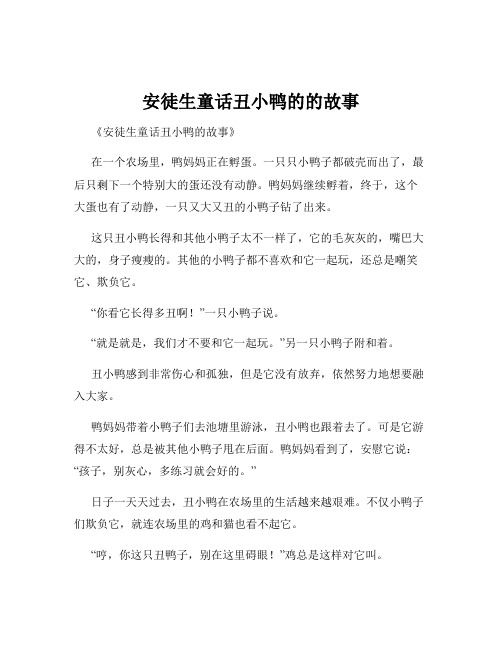
安徒生童话丑小鸭的的故事《安徒生童话丑小鸭的故事》在一个农场里,鸭妈妈正在孵蛋。
一只只小鸭子都破壳而出了,最后只剩下一个特别大的蛋还没有动静。
鸭妈妈继续孵着,终于,这个大蛋也有了动静,一只又大又丑的小鸭子钻了出来。
这只丑小鸭长得和其他小鸭子太不一样了,它的毛灰灰的,嘴巴大大的,身子瘦瘦的。
其他的小鸭子都不喜欢和它一起玩,还总是嘲笑它、欺负它。
“你看它长得多丑啊!”一只小鸭子说。
“就是就是,我们才不要和它一起玩。
”另一只小鸭子附和着。
丑小鸭感到非常伤心和孤独,但是它没有放弃,依然努力地想要融入大家。
鸭妈妈带着小鸭子们去池塘里游泳,丑小鸭也跟着去了。
可是它游得不太好,总是被其他小鸭子甩在后面。
鸭妈妈看到了,安慰它说:“孩子,别灰心,多练习就会好的。
”日子一天天过去,丑小鸭在农场里的生活越来越艰难。
不仅小鸭子们欺负它,就连农场里的鸡和猫也看不起它。
“哼,你这只丑鸭子,别在这里碍眼!”鸡总是这样对它叫。
猫也总是对它张牙舞爪:“快走开,丑八怪!”丑小鸭心里很难过,它觉得这里没有它的容身之地,于是它决定离开农场,去外面的世界看看。
它走啊走,来到了一片沼泽地。
这里有一群野鸭子,丑小鸭高兴地跑过去想和它们做朋友。
可是野鸭子们看到它的样子,也不愿意接纳它。
“你长得这么奇怪,不是我们的同类。
”野鸭子们说。
丑小鸭只好继续往前走,它又饿又累,但是它没有放弃希望。
走着走着,丑小鸭来到了一个农舍前。
农舍里的老太太收留了它,因为她觉得丑小鸭可以下蛋。
可是丑小鸭在这里待了一段时间后,还是没有下出蛋来,老太太就生气了,把它赶了出去。
丑小鸭再次踏上了流浪的旅程。
天气越来越冷,丑小鸭冻得瑟瑟发抖。
它来到了一条河边,河里的水都结冰了。
丑小鸭趴在冰上,差一点就被冻死了。
幸运的是,一个猎人路过,看到了丑小鸭,把它带回了家。
可是猎人家里的猎狗却对着丑小鸭大声吼叫,吓得丑小鸭赶紧逃走了。
丑小鸭不停地走啊走,经历了无数的困难和挫折。
终于,春天来了,天气渐渐变暖,丑小鸭来到了一个美丽的湖边。
丑小鸭的故事 原文
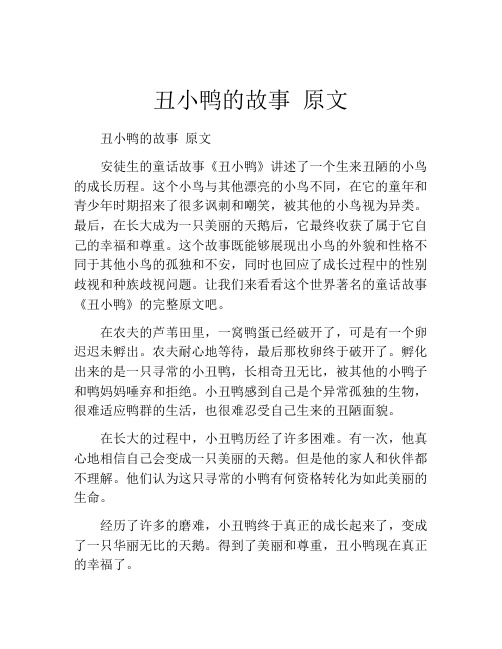
丑小鸭的故事原文丑小鸭的故事原文安徒生的童话故事《丑小鸭》讲述了一个生来丑陋的小鸟的成长历程。
这个小鸟与其他漂亮的小鸟不同,在它的童年和青少年时期招来了很多讽刺和嘲笑,被其他的小鸟视为异类。
最后,在长大成为一只美丽的天鹅后,它最终收获了属于它自己的幸福和尊重。
这个故事既能够展现出小鸟的外貌和性格不同于其他小鸟的孤独和不安,同时也回应了成长过程中的性别歧视和种族歧视问题。
让我们来看看这个世界著名的童话故事《丑小鸭》的完整原文吧。
在农夫的芦苇田里,一窝鸭蛋已经破开了,可是有一个卵迟迟未孵出。
农夫耐心地等待,最后那枚卵终于破开了。
孵化出来的是一只寻常的小丑鸭,长相奇丑无比,被其他的小鸭子和鸭妈妈唾弃和拒绝。
小丑鸭感到自己是个异常孤独的生物,很难适应鸭群的生活,也很难忍受自己生来的丑陋面貌。
在长大的过程中,小丑鸭历经了许多困难。
有一次,他真心地相信自己会变成一只美丽的天鹅。
但是他的家人和伙伴都不理解。
他们认为这只寻常的小鸭有何资格转化为如此美丽的生命。
经历了许多的磨难,小丑鸭终于真正的成长起来了,变成了一只华丽无比的天鹅。
得到了美丽和尊重,丑小鸭现在真正的幸福了。
所有的人们他都认识,但是人们都以为他很美而且是一位很特殊的鸟。
他感到自己最终得到了认同和尊重,也发现自己一直在寻找的家园。
他可以自在地飞行,而且与伙伴们没有任何的差别,感觉自己是一个家庭的一份子。
安徒生的故事《丑小鸭》将许多现代社会存在的问题融合在自己的故事里面,充分展现出了人性的美好。
故事告诉我们,我们应该尊重并欣赏每个人的相貌和个性,不应该仅仅根据一个人的外貌或所在的群体来评价和排斥他们。
每个人都有自己的亮点,作为社会的一份子,我们应该共同致力于创建一个更为友好和包容的环境,让每个人都能够感觉到自己的价值和重要性。
总之,安徒生经典童话《丑小鸭》描绘的是一个少数全天下最美丽、最年轻的美人和一个不被任何人理解的小丑鸭的成长故事。
故事的背后寓意深刻,引导读者追寻真正幸福。
- 1、下载文档前请自行甄别文档内容的完整性,平台不提供额外的编辑、内容补充、找答案等附加服务。
- 2、"仅部分预览"的文档,不可在线预览部分如存在完整性等问题,可反馈申请退款(可完整预览的文档不适用该条件!)。
- 3、如文档侵犯您的权益,请联系客服反馈,我们会尽快为您处理(人工客服工作时间:9:00-18:30)。
安徒生童话故事第109篇:在养鸭场里The Portuguese Duck引导语:大家是否去过养鸭场呢?下面是安徒生《在养鸭场里》,我们一起阅读与学习,看看是讲了哪些内容?有一只母鸭从葡萄牙到来了。
有人说她是从西班牙来的,不过这也没有什么了不起的分别。
大家都把她叫葡萄牙的鸭子。
她下蛋,被人杀掉,然后被做成菜拿出来吃——这就是她一生的事业。
不过,从她的蛋里爬出的那些小鸭子居然也被叫做葡萄牙的鸭子——这里面倒颇有文章。
这整个家族现在只剩下一只鸭子了。
她住在养鸭场里,而这个场子鸡也可以进去。
有一只公鸡就在里面趾高气扬地走来走去。
“他的大声啼叫倒使我怪讨厌的,”葡萄牙的鸭子说。
“不过,虽然他不是一只公鸭,他倒还是蛮漂亮的——谁也不能否认这一点。
他应该把他的声音略微节制一下,但是‘节制’是一种艺术,只有受过高等教育的人才能做得到。
附近菩提树上的那些小小歌鸟就是这样。
他们唱得才好听呢!他们的歌里有某种感动人的特点。
我认为这种特点才配得上‘葡萄牙’这个形容词。
如果我有这样的一只小歌鸟,我倒很愿意做他的慈爱的母亲呢,因为在我的血统里——葡萄牙的血统里——我有这种慈爱的心肠。
”当她正在说这话的时候,忽然有一只小小的歌鸟坠落下来了。
他是从屋顶上倒栽葱地坠落下来的。
一只猫儿在追着他,但是鸟儿拍着受伤的翅膀逃脱了,最后落到养鸭场里来。
“你看猫儿这个坏东西,简直原形毕露!”葡萄牙的鸭子说,“自从我有了孩子以后,我就领教过他了!这样一个东西居然得到生存的权利,在屋顶上跑来跑去!我想这种事情在葡萄牙是不容许的。
”她可怜这只小歌鸟,别的非葡萄牙种的鸭子也可怜他。
“可怜的小东西!”她们说,于是她们一个接着一个地围拢来了。
“我们是不会唱歌的,”她们说,“不过我们有一种内在的‘歌唱感’——或者类似这样的东西。
这一点我们可以感觉得到,虽然我们不把它挂在嘴边。
”“但是我可要讲出来,”葡萄牙的鸭子说,“而且我要帮助他,这是我的责任。
”于是她走进水槽里去,用翅膀在水里大拍一通。
她拍出的水几乎把这只小歌鸟淹死了,但是她的用意是好的。
“这才是帮助人呢,”她说;“别的人可以仔细瞧瞧,向我学习。
”“吱!”小鸟说。
他有一只翅膀受了伤,很难飞动,不过他知道,这次淋水完全是由善意所造成的。
“太太,您是一个好心肠的人!”他说,不过他不希望再淋一次水。
“我从来没有想到过我的心肠,”葡萄牙的鸭子说。
“不过有一件事情我知道:我爱我周围的一切生物——只有猫子是例外。
谁也不能希望我爱他,因为他吃掉过我的两个孩子!不过请你把这儿当作你的家吧,因为你可以这样办呀!我本人就是从外国来的——这一点你可以从我的态度和我的羽衣看得出来。
我的鸭公是本地人,没有我这样的血统——但我并不因此而骄傲!如果这里有什么人了解你的话,我敢说这人就是我。
”“她的嗉子里全是葡萄拉①,”一只很有风趣的普通小鸭说。
别的一些普通小鸭认为“马齿觅”这个字用得非常妙,因为它的发音跟“葡萄牙”这名词差不多。
大家彼此轻轻地推了一下,同时说一声“嘎!”这只小鸭真是滑稽透了!于是大家便开始注意那只小小的.歌鸟了。
“葡萄牙鸭子在掌握语言方面真有本领,”大家说。
“我们的嘴里就装不住这样大的字眼,不过我们的同情心却并不比她小。
如果我们不能替你做点什么事情,我们就一句话也不讲——我们觉得这是一种最好的办法!”“你有一个很美丽的声音,”最老的一只鸭子说。
“你这样能够叫许多人快乐,你自己一定也很满意的吧。
我对于唱歌不内行,因此我就把我的嘴闭起来。
这比讲无聊的话好得多——别人就是喜欢对你讲无聊话。
”“请不耍这样麻烦他吧!”葡萄牙鸭子说。
“他需要休息和保养呀。
小小的歌鸟,要不要我们再给你淋一次水?”“哎唷,不要!我愿意保持干燥!”他恳求说。
“就我说来,唯一有效的办法是水疗,”葡萄牙鸭子说。
“不过游戏也有效!邻近的鸡子不久就要来拜访我们。
他们中间有两只中国母鸡。
她们穿着长裤子,都受过很好的教育,而且是从外国来的。
这在我看来,她们的地位提高不少。
于是母鸡来了,公鸡也来了。
这只公鸡今天算是相当客气,没有当场摆架子。
“你是一只真正的歌鸟,”他说。
“凡是你的小声音所能做到的事情,你全都做到了。
不过你还得加一点劲儿,好使人家一听就知道你是一只公鸟。
”这两只中国鸡被歌鸟的一副样儿迷住了。
他的毛淋了一番水后仍然是蓬着的,因此她们都觉得他很像一只中国小鸡。
“他很可爱!”于是她们开始跟他聊起天来。
她们用贵族的中国话——其中包括低声和“呸”这类的声音——和他交谈。
“我们和你是同一个种族。
鸭子——甚至葡萄牙的鸭子——是属于水鸟这一族的,这一点你一眼就可以看得出来。
你还不认识我们,不过有多少人认识我们或愿意花点工夫来认识我们呢?没有一个人,连一个母鸡也没有,虽然比起大多数人来,我们生来就是要栖在更高一层的栖柱上的。
不过这也没有什么了不起的关系:我们跟大家一起安静地过我们自己的日子。
他们的理想跟我们的理想大不相同,但是我们只看好的一面,我们只谈好的事情,虽然本来没有什么好话而硬说好是很困难的。
除了我们两个和那只公鸡以外,鸡屋里再没有一个有天才的人。
谈到‘诚实’,养鸭场里没有一个人是诚实的。
小小的歌鸟,我们忠告你:你切不要相信那边的一个短尾巴的女人,她才狡猾呢。
那个翅膀上长着弯线条的杂色女人专门找人吵架。
虽然她自己没有理,她可不让别人讲一句话。
那边的一只肥鸭子总是说人家的坏话,这是跟我们的性格相反的。
如果我们不能说人家的好话,那末你把嘴闭起来好了。
那只葡萄牙鸭子是唯一受过一点教育的人。
你可以跟她来往,不过她太感情用事,老是谈起葡萄牙。
”“那两个中国女人的话真多!”有一对鸭子说。
“她们真使我感到讨厌!我从来没有跟她们讲过话。
”现在公鸭来了!他以为歌鸟是一只麻雀。
“嗯,我看不出什么分别,”他说,“全是半斤八两!他是一个玩物。
有他没有他都是一样。
”“不要理他说的这一套!”葡萄牙鸭子低声说。
“他做起生意来可是蛮有道理的,而且他只懂得生意。
不过现在我要躺下来休息一下。
我应该这样办,为的是要使我能长得胖些,好叫人能在我身上涂一层苹果和梅子酱②。
”于是她眨着一只眼睛在太阳光里躺下来。
她舒舒眼服地躺着,也感到非常舒服,也睡得非常舒服。
歌鸟忙着啄他那只受了伤的翅膀,最后他也在他的恩人身边躺下来。
太阳照得又温暖,又光明。
这真是一块好地方。
邻家来的母鸡在扒土。
老实讲,她们来拜访完全是为了找点东西吃。
那两只中国鸡先离开,其余的也跟着走了。
那只风趣的小鸭谈到葡萄牙鸭子的时候说,这个老太婆快要过她的“第二度童年”了。
别的鸭子都笑起来:“第二度童年!他的话说得真妙!”于是大家又提起头一次关于“葡萄拉”的玩笑。
这真是非常滑稽!于是大家都躺下来了。
他们躺了一会儿以后,忽然有人抛了一点吃的东西到场子里来。
这东西“砰”的一声落到地上,弄得大家从睡梦中惊醒过来,拍起翅膀。
葡萄牙鸭子也醒了,她翻了一个身,把那只小歌鸟压得透不过气来。
“吱!”他叫起来。
“太太,您压得太重了!”“谁叫你躺在我面前呢?”她说。
“你太神经过敏了!我也有神经呀,但是我从来不说一声‘吱’!”“请您不要生气吧!”小鸟说。
“这个‘吱’是不知不觉地从我的嘴里冒出来的。
”葡萄牙鸭子不理他,但是尽快地抢那食物吃,而且吃得很痛快。
她吃完了以后又躺下来。
小鸟走过来,想用歌声引起她的好感:滴——丽,滴——丽!您的好心地是我歌唱的主题,我要飞起,飞起。
“吃完饭以后我得休息一下,”她说。
“你住在这里,必须遵守这里的规矩!我现在要睡了。
”小歌鸟大吃一惊,因为他本来的用意是很好的。
太太睡醒了以后,他衔着他所寻到的一颗麦粒站在她面前。
他把麦粒放在她的脚下。
但是她没有睡好,因此她的心情自然不佳。
“把这送给小鸡吃吧,”她说,“不要老呆在我旁边呀!”“但是您为什么要生我的气呢?”他问。
“我做了什么对不起您的事情呢?”“做了什么对不起我的事情!”葡萄牙鸭子说。
“你用的字眼不太文雅!这一点我请你注意。
”“昨天这里有太阳光,”小鸟说。
“今天这里却是阴暗的!这使我感到怪难过的。
”“你对于天气的知识是一窍不通!”葡萄牙鸭子说。
“这一天还没有完呀。
不要呆在这儿像一个傻瓜吧!”“您看人的这副凶样子,跟我落到这里时那些恶眼睛看我的凶样子差不多。
”“简直岂有此理!”葡萄牙鸭子说。
“难道你把我跟那个强盗——那只猫相比吗?我身体里一滴坏血也没有。
我得为你负责任,我要教你学些礼貌。
”于是她就把这歌鸟的头咬掉了。
他倒下死了。
“这是什么意思?”她说,“难道他这一点都受不了?这样说来,他是不配活在这个世界上的了!我对他一直是像一个母亲;这一点我知道,因为我有一颗母亲的心。
”邻家的公鸡把头伸进院子里来,像一个火车头似地大叫了一声。
“你这一叫简直要把我吓死了,”她说。
“这完全要怪你。
他吓掉了他的头,我也几乎要吓掉我的头。
”“他这么点小的东西有什么值得一提,”公鸡说。
“对他说话放客气些吧!”葡萄牙鸭子说。
“他有声音,他会唱歌,他受过好的教育!他很体贴,也很温柔——无论在动物中,或在你所谓的人类中,这都是很好的。
”所有的鸭子都挤到这只死去了的小歌鸟身边来。
不管他们是感到嫉妒或怜悯,这些鸭子都表现得非常热情。
但是现在这儿既然没有什么东西可嫉妒,他们自然感到怜悯。
甚至那两只中国母鸡都是这样。
“我们再也找不到这样的歌鸟了!他差不多算得是一只中国鸟。
”于是母鸡都嘎嘎地哭起来,不过鸭子只是把眼睛弄得红了一点。
“我们都是好心肠的人,”她们说。
“这一点谁也不能否认。
”“好心肠!”葡萄牙鸭子说,“是的,我们都有好心肠,差不多跟在葡萄牙一样!”“我们现在还是找点东西塞进嗉子里去吧,”鸭公说。
“这才是重要的事情呢!一个玩物打碎了算什么?我们有的是!”①原文是Hun har portulak i Kroen,无法翻译。
葡萄拉(portulak)在丹麦文里是“马齿觅”,而portulak这个字跟“葡萄牙”(Portugal)的读音相似。
因此当葡萄牙的鸭子说她身体里有葡萄牙的血统时,这只小鸭就开她一个文字玩笑,说她的身体里全是“葡萄拉”(马齿觅)。
②欧洲人吃烤鸭时经常用苹果和梅子酱做作料。
在养鸭场里英文版:The Portuguese DuckADUCK once arrived from Portugal, but there were some who said she came from Spain, which is almost the same thing. At all events, she was cal led the “Portuguese,” and she laid eggs, was killed, and cooked, and there was an end of her. But the ducklings which crept forth from the eggs were also called “Portuguese,” and about that there may be some question. But of all the family one only remained in the duckyard, which may be called a farmyard, as the chickens were admitted, and the cock strutted about in a very hostile manner. “He annoys me with his loud crowing,” said the Portuguese duck; “but, still, he’s a handsome bird, there’s no denying th at, althoughhe’s not a drake. He ought to moderate his voice, like those little birds who are singing in the lime-trees over there in our neighbor’sgarden, but that is an art only acquired in polite society. How sweetly they sing there; it is quite a pleasure to listen to them! I call it Portuguese singing. If I had only such a little singing-bird, I’d be kind and good as a mother to him, for it’s in my nature, in my Portuguese blood.”While she was speaking, one of the little singing-birds came tumbling head over heels from the roof into the yard. The cat was after him, but he had escaped from her with a broken wing, and so came tumbling into the yard. “That’s just like the cat, she’s a villain,” said the Portuguese duck. “I remember her ways when I had children of my own. How can such a creature be allowed to live, and wander about upon the roofs. I don’t think they allow such things in Portugal.” She pitied the little singing-bird, and so did all the other ducks who were not Portuguese.“Poor little creature!” they said, one after another, as they came up. “We can’t sing, certainly; but we have a sounding-board, or something of the kind, within us; we can feel that, though we don’t talk about it.”“But I can talk,” said the Portuguese duck; “and I’l l do something for the little fellow; it’s my duty;” and she steppedinto the water-trough, and beat her wings upon the water so strongly that the bird was nearly drowned by a shower-bath; but the duck meant it kindly. “That is a good deed,” she said; “I h ope the otherswill take example by it.”“Tweet, tweet!” said the little bird, for one of his wings being broken, he found it difficult to shake himself; but he quite understood that the bath was meant kindly, and he said, “You are very kind-hearted, mad am;” but he did not wish for a second bath.“I have never thought about my heart,” replied the Portuguese duck, “but I know that I love all my fellow-creatures, except the cat, and nobody can expect me to love her, for she ate up two of my ducklings. But pray make yourself at home; it is easy to make one’s self comfortable. I am myself from a foreign country, as you may see by my feathery dress. My drake is a native of these parts; he’s not of my race; but I am not proud on that account. If any one here can understand you, I may say positively I am that person.”“She’s quite full of ‘Portulak,’” said a little common duck, who was witty. All the common ducks considered the word “Portulak”a good joke, for it sounded like Portugal. They nudged each other, and said, “Quack! that was witty!”Then the other ducks began to notice the little bird. “The Portuguese had certainly a great flow of language,” they said to the little bird. “For our part we don’t care to fill our beaks with such long words, but we sympathize with you quite as much. If we don’t do anything else, we can walk about with you everywhere, and we think that is the best thing we can do.”“You have a lovely voice,” said one of the eldest ducks; “it must be great satisfaction to you to be able to give so much pleasure as you do. I am certainly no judge of your singing so I keep my beak shut, which is better than talking nonsense, as others do.”“Don’t plague him so,” interposed the Portuguese duck; “he requires rest and nursing. My little singing-bird do you wish me to prepare another bath for you?”“Oh, no! no! pray let me dry,” implored the little bird.“The water-cure is the only remedy for me, when I am not well,” said the Portuguese. “Amusement, too, is very beneficial. The fowls from the neighborhood will soon be here to pay you a visit. There are two Cochin Chinese amongst them; they wear feathers on their legs, and are well educated. They have been brought from a great distance, and consequently I treat them with greater respect than I do the others.”Then the fowls arrived, and the cock was polite enough to-day to keep from being rude. “You are a real songster,” he said, “you do as much with your little voice as it is possible to do; but there requires more noise and shrillness in any one who wishes it to be known who he is.”The two Chinese were quite enchanted with the appearance of the singing-bird. His feathers had been much ruffled by his bath, so that he seemed to them quite like a tiny Chinese fowl. “He’s charming,” they said to each other, and began a conversation with him in whispers, using the most aristocratic Chinese dialect: “We are of the same race as yourself,” they said. “The ducks, even the Portuguese, are all aquatic birds, as you must have noticed. You do not know us yet,—very few know us, or give themselves the trouble to make our acquaintance, not even any of the fowls, though we are born to occupy a higher grade in society than most of them. But that doesnot disturb us, we quietly go on in our own way among the rest, whose ideas are certainly not ours; for we look at the bright side of things, and only speak what is good, although that is sometimes very difficult to find where none exists. Except ourselves and the cock there is not one in the yard who can be called talented or polite. It cannot even be said of the ducks, and we warn you, little bird, not to trust that one yonder, with the short tail feathers, for she is cunning; that curiously marked one, with the crooked stripes on her wings, is a mischief-maker, and never lets any one have the last word, though she is always in the wrong. That fat duck yonder speaks evil of every one, and that is against our principles. If we have nothing good to tell, we close our beaks. The Portuguese is the only one who has had any education, and with whom we can associate, but she is passionate, and talks too much about ‘Portugal.’”“I wonder what those two Chinese are whispering about,” whispered one duck to another; “they are always doing it, and it annoys me. We never speak to them.”Now the drake came up, and he thought the little singing-bird was a sparrow. “Well, I don’t understand the difference,” he said;“it appears to me all the same. He’s only a plaything, and if people will have playthings, why let them, I sa y.”“Don’t take any notice of what he says,” whispered the Portuguese; “he’s very well in matters of business, and with him business is placed before everything. But now I shall lie down and have a little rest. It is a duty we owe to ourselves that we may be nice and fat when we come to be embalmed with sage and onions and apples.” So she laid herself down in the sun and winked with one eye; she had a very comfortable place, and felt so comfortable that she fell asleep. The little singing-bird busied himself for some time with his broken wing, and at last he lay down, too, quite close to his protectress. The sun shone warm and bright, and he found out that it was a very good place. But the fowls of the neighborhood were all awake, and, to tell the truth, they had paid a visit to the duckyard, simply and solely to find food for themselves. The Chinese were the first to leave, and the other fowls soon followed them.The witty little duck said of the Portuguese, that the old lady was getting quite a “doting ducky,” All the other ducks laughed at this. “Doting ducky,” they whispered. “Oh, that’s too‘witty!’” And then they repeated the former joke about “Portulak,” and declared it was most amusing. Then they all lay down to have a nap.They had been lying asleep for some time, when suddenly something was thrown into the yard for them to eat. It came down with such a bang, that the whole company started up and clapped their wings. The Portuguese awoke too, and rushed over to the other side: in so doing she trod upon the little singing-bird.“Tweet,” he cried; “you trod very hard upon me, madam.”“Well, then, why do you lie in my way?” she retorted, “you must not be so touchy. I have nerves of my own, but I do not cry‘tweet.’”“Don’t be angry,” said the little bird; “the ‘tweet’ slipped out of my beak unawares.”The Portuguese did not listen to him, but began eating as fast as she could, and made a good meal. When she had finished, she lay down again, and the little bird, who wished to be amiable, began to sing,—“Chirp and twitter,The dew-drops glitter,In the hours of sunny spring,I’ll sing my best,Till I go to rest,With my head behind my wing.”“Now I want rest after my dinner,” said the Portuguese; “you must conform to the rules of the house while you are here. I want to sleep now.”The little bird was quite taken aback, for he meant it kindly. When madam awoke afterwards, there he stood before her with a little corn he had found, and laid it at her feet; but as she had not slept well, she was naturally in a bad temper. “Give that to a chicken,” she said, “and don’t be always standing in my way.”“Why are you angry with me?” replied the little singing-bird, “what have I done?”“Done!” repeated the Portuguese duck, “your mode of expressing yourself is not very polite. I must call your attention to that fact.”“It was sunshine here yesterday,” said the little bird, “but to-day it is cloudy and the air is close.”“You know very little about the weather, I fancy,” she retorted, “the day is not over yet. Don’t stand there, looking so stupid.”“But you are looking at me just as the wicked eyes looked when I fell into the yard yesterd ay.”“Impertinent creature!” exclaimed the Portuguese duck: “would you compare me with the cat—that beast of prey? There’s not a drop of malicious blood in me. I’ve taken your part, and now I’ll teach you better manners.” So saying, she made a bite at th e little singing-bird’s head, and he fell dead on the ground. “Now whatever is the meaning of this?” she said; “could he not bear even such a little peck as I gave him? Then certainly he was not made for this world. I’ve been like a mother to him, I know that, for I’ve a good heart.”Then the cock from the neighboring yard stuck his head in, and crowed with steam-engine power.“You’ll kill me with your crowing,” she cried, “it’s all your fault. He’s lost his life, and I’m very near losing mine.”“There’s not much of him lying there,” observed the cock.“Speak of him with respect,” said the Portuguese duck, “for he had manners and education, and he could sing. He was affectionate and gentle, and that is as rare a quality in animals as in those who call themselves human beings.”Then all the ducks came crowding round the little dead bird. Ducks have strong passions, whether they feel envy or pity. There was nothing to envy here, so they all showed a great deal of pity, even the two Chinese. “We shall never have another singing-bird again amongst us; he was almost a Chinese,” they whispered, and then they wept with such a noisy, clucking sound, that all the other fowls clucked too, but the ducks went about with redder eyes afterwards. “We have hearts of our own,” they said, “nobody can deny that.”“Hearts!” repeated the Portuguese, “indeed you have, almost as tender as the ducks in Portugal.”“Let us think of getting something to satisfy our hunger,” said the drake, “that’s the most important busines s. If one of our toys is broken, why we have plenty more.”。
